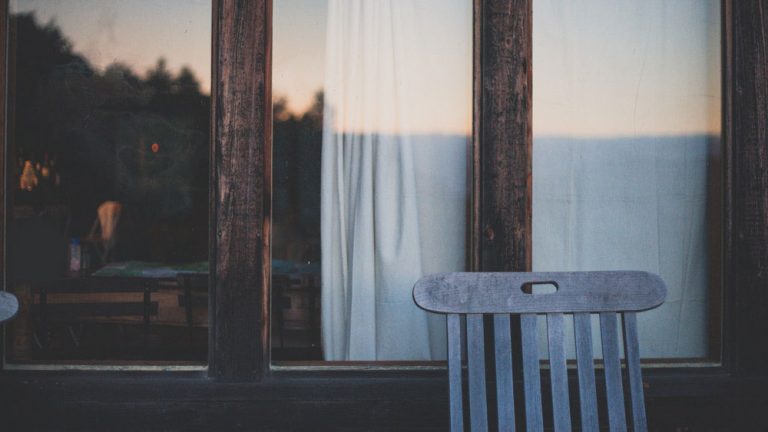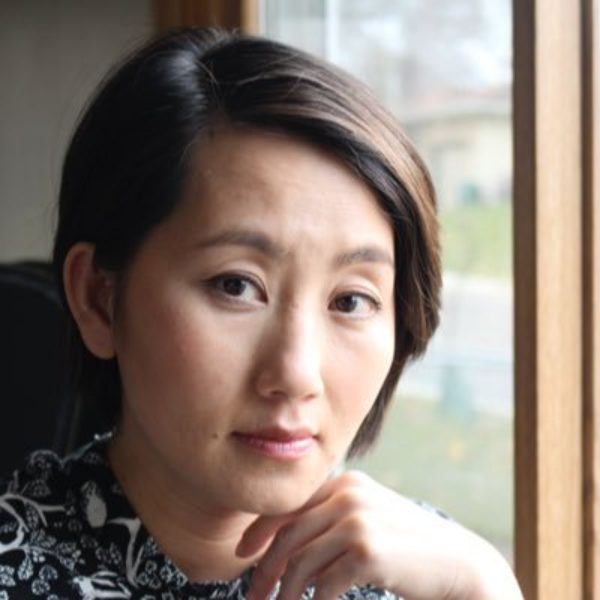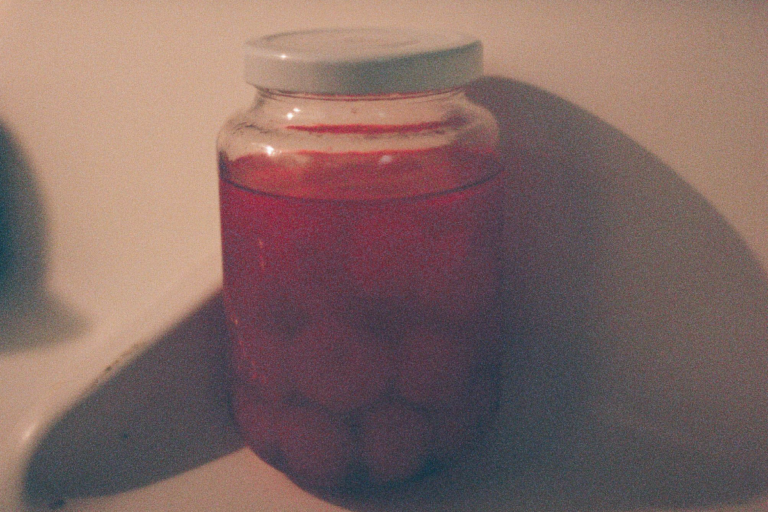
Image by Logan Adermatt/Unsplash.
The Blue House That I Loved
In a plot of grass, behind a bar on Payne, right off Maryland Avenue on the east side of St. Paul there was once a blue house that I loved.
I remember the house the way it was: a blue two-story built sometime in the late 1890s. A farm house with a damp, earthen basement full of broken concrete on the floor, its walls sagging earth and cement. The house, whatever it had been, by 1988 was a duplex that was rented out to Hmong families.
Upstairs, there was an elderly man, his thin wife, and their two children. The family kept mostly to themselves, so beyond vague memories of the mother and the father and their two girls passing us by in the tiny bit of lawn to the back of the house, all I remember are the sounds of a broomstick thumping the floor each time we children played too loudly, laughed too hard. It was not a jarring, angry sound. It was always just a friendly thump, thump, thump, a reminder that there were people who shared the house and who preferred quiet.

The layout of the house, at least the bottom part that I knew, was simple. The front of the house facing Maryland Avenue held a three season porch. The front door was always closed. My two boy cousins slept in the porch. Their full-size bed — a mattress my aunt had gotten from a church basement, set up on old milk crates — filled the entirety of the porch so that neither the door to the porch nor the door outside could be opened, ever. My boy cousins used to crawl into the house from a window in the living area, their hair during wintertime frozen stiff from their nightly showers. We children took turns touching their hair in amazement and wonder.
The dark living area held two sofas, both brown in color though mismatched, more donations from church basements. My aunt used to cover the sofas with old bed sheets in case we spilled our rice and water during meal times.
On the bottom of the living room floor, my aunt had spread a woven plastic mat for us children to sit and play on. It was the only splash of color in the room. Its design was a garden of flowers in symmetric bloom.
The only light in the dim room came from the black and white television set, another find from a church basement, and an old lamp in the corner.
Beyond the living space, there were two bedrooms along a tight hallway, separated by a full bathroom. Each bedroom was small. Their curtained windows perpetually closed.
In one bedroom, my aunt and my uncle slept with my two younger cousins on double mattresses, once again set up on milk crates. Their clothes were kept in baskets in the sliver of a closet at the end of the beds they slept on.
In the last bedroom, there were two full mattresses, set up once more with milk crates, where my three older girl cousins slept. In their room, they had a portable stereo where they played cassette tapes of Thai and Chinese singers, and the occasional Richard Marx songs.
The last room of the house, at its back, was a small kitchen with a round dining table that was only big enough for the adults, so us children sat usually in the living room, plates of food on our knees, before the blinking black and white television. The kitchen smelled of the things we ate: rice, boiled pork bones, fried eggs, instant noodles from Thailand and China, and pickled mustard greens.
In the kitchen, there was a single window fan that blew through the hot summers. It was there, on that table, that I watched my aunt and my mother clean piles of mustard greens, salt them, squeeze the salty water out, and make jars upon jars of the pickled greens we loved, enough to see us through the long winters. Sometimes, they’d blanch beans, buckets of them, put them into zip lock bags and then freeze them.
The place I loved most in that blue house though was that back porch, a slab of concrete that was two steps off the ground. It was the clean between the house and the earth. It was there that I saw my aunt breastfeed my cousin for the first time, the baby’s plump hands fisted at her sides, mouth busy at work. I thought then that my aunt had the longest breasts I’d ever seen (next to my grandma’s). I remember saying to her, “Your breast will one day touch the ground.” I remember the trill of my aunt’s laughter in the wake of my words.
It was on that back porch where I got into my first physical fight. My cousin was only four at the time. I was seven. She was normal-sized for her age. I was small for mine. She stood by the back door. The adults were around us. For some reason I no longer recall, I was so angry at her that my hands went before my face and the space between us was eaten by our fists. I landed a blow. She landed several. I cried. She cried. My angry father held me in the air, my fist still swinging wide before my face, my heart’s eruptions still bubbling through. The deep feeling of remorse when my feet touched the grass, no longer the platform we’d played house and market on, but the darn grass — which I believed was dirty like me in that moment.
It was on that back porch where we greeted my uncle after his gallstone surgery. It was the first time someone we loved was truly sick in America. We hadn’t been able to visit him at the hospital. The adults all said that the children would just be a bother and upset the American nurses, who the adults were already sure they were already bothering them with their endless visits, their late night vigils, the steady stream of their concern. I remember my cousins, my older sister and me, all standing on that slab of concrete, waiting for Uncle to walk from the car into the house, my aunt on one side of him and my father on the other. Tears flowed from our faces. Our small hands pressed to our mouths to keep the fear we’d carried of death in America contained.
My aunt and uncle lived in that cramped bottom duplex for two years. They felt the house was too small. They were concerned that the older boys would grow sick sleeping on that cold porch. They grew afraid for the safety of the children when the drunk men from the bar on Payne Avenue wandered too close to the house, knocked on windows and doors. When they moved out of that house, they moved across the city, further away from us. But each time we passed that blue house in the back of the old cars our father used to drive, and even as we started driving ourselves, my sister and I still called it, “Auntie and Uncle’s house.” The memory of that house kept them close to us long after our lives in America had spread us out further from each other.
One day, three years ago, a big truck came and the house came down, bit by bit, until all that remained was the dark hole of the basement where my cousins, my older sister, and me, once upon a time, beneath a single swinging bulb, played hopscotch across concrete and dirt. Then, the hole was filled. Suddenly, green grass was growing in the place where the blue house once stood.
Now, it is gone, and all we have left is an old aunt and uncle, cousins who work near and far, and the memories that we individually carry of that place where we had all been poor together, in love with each other, unaware that a house could disappear, that our lives would take us far from each other, and that love spread far too thin across time and space grows faint like dreams, lives on like ghosts.

